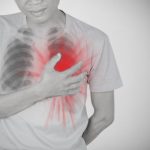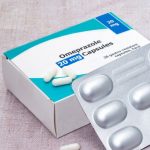Heartburn For Days In A Row: Causes & Treatment.
Heartburn for days in a row may reflect a chronic condition called gastroesophageal reflux disease (GERD or chronic acid reflux). However, a group of less common conditions other than GERD can cause persistent heartburn. The most common causes are hiatus hernia, functional heartburn, non-acid reflux, and other rare causes such as eosinophilic esophagitis and esophageal cancer.
Common causes of persistent heartburn for days or weeks in a row:
- GERD (chronic acid reflux).
- Development of GERD complications such as erosive esophagitis, Barret’s esophagus, and esophageal cancer.
- Wrong medications or wrong doses.
- Functional heartburn.
- Non-acid reflux.
- Reflux hypersensitivity.
- Other rare causes such as eosinophilic esophagitis, achalasia
1- Acid reflux (GERD) attacks.
Gastroesophageal reflux disease (GERD or chronic acid reflux) is the most common cause of heartburn. It is a very common disease worldwide. In The USA, GERD affects 18.1% to 27.8% of people (ref).
A weakness in the sphincter between your stomach and esophagus usually causes it. Normally, this sphincter (called the lower esophageal sphincter) prevents the acid in your stomach from refluxing back into the esophagus (ref).
How to suspect Acid reflux (GERD):
- Heartburn: Normal people can experience intermittent heartburn attacks (Physiological GERD). But if GERD is present and undiagnosed, it can cause persistent heartburn for 3, 5, 7 days, or even weeks.
- Regurgitation of acidic fluid or food particles into your throat or mouth.
- Night attacks of severe heartburn and choking due to acid reflux during lying down.
- Difficulty swallowing (dysphagia), common with acid reflux esophagitis.
- Chest pain can mimic a heart attack.
- Increased salivation.
- Nausea and vomiting.
How to fix persistent heartburn due to GERD.
- Get diagnosed: You can’t use the internet to self-diagnose such conditions. Persistent heartburn must be evaluated and diagnosed by your doctor.
- Avoid foods that trigger GERD: Fatty foods, spicy foods, caffeine, and acidic foods such as tomatoes and citrus fruits.
- Avoid sleeping or lying down after eating (for 2-3 hours).
- Elevate your head (one of the most effective evidence-based treatments for acid reflux). Use more than one pillow, or obtain a GERD wedge pillow.
- Use acid-reducing agent: The gold standard to relieve persistent heartburn due to GERD is to decrease acid production. The most commonly used medications include:
- Proton Pump Inhibitors: such as Omeprazole (Prilosec) and Esomeprazole (Nexium)
- H2 Blockers: such as Famotidine (Pepcid).
- Antacids: such as Magnesium Hydroxide (Milk of Magnesia), Calcium carbonate (Tums), Aluminum hydroxide gel (Alternagel), and Pepto-Bismol.
- Also, Prokinetics, some muscle relaxants, and Probiotics can help with GERD (See The best probiotics for GERD And IBS).
- Weight reduction improves GERD in obese patients.
If you are a GERD sufferer with Persistent heartburn for days in a row, see the causes of persistent GERD (acid reflux).
2- Development of GERD complications:
This section is for people who were already diagnosed with GERD. Persistent heartburn for days can be a sign of GERD complications.
Common GERD complications that cause persistent heartburn:
- Erosive esophagitis: in severe cases of GERD, a breakdown in the lining of the esophagus occurs. It is a form of superficial painful ulceration, usually in the lower third of the esophagus (ref). (see the image below)
(Erosive Esophagitis)
- Barret’s esophagus: Due to chronic irritation, the lining cells of your esophagus start to change. The cells transform into another type similar to those lining your small intestine. Persistent heartburn is not common with Barret’s esophagus. However, the barret’s esophagus carries more cancer risk. Learn More.
- Cancer esophagus: A less common but serious complication of persistent acid reflux. Patients with cancer esophagus suffer from persistent heartburn for days or weeks (not responding to acid-reducing medications), Difficulty swallowing, vomiting, lost appetite, and weight loss. Learn More.
3 – Medication-related causes (in GERD sufferers).
Heartburn may persist in people with GERD (chronic acid reflux) because of the wrong treatment.
Common causes of persistent heartburn despite taking GERD medications may involve:
A- Weak medications.
In severe cases of acid reflux, you may not respond to weaker anti-acid medications such as antacids and H2 blockers (such as Pepcid). You may need to shift to a stronger GERD medication in such a case.
Proton Pump Inhibitors (PPIs) are the most powerful anti-acid medication for GERD. We (Doctors) consider PPIs the gold standard for treating chronic acid reflux.
Ask your doctor about taking PPI medication for persistent heartburn. This is important if you are not responding to antacids and H2 blockers.
B- Suboptimal doses.
Taking under-therapeutic doses of GERD medications can cause persistent heartburn.
Your doctor usually gradually increases the PPI dose to a maximum of 40 mg twice daily (for omeprazole, pantoprazole, or esomeprazole) twice daily.
If you fail to respond to smaller doses (such as omeprazole 20 mg once daily), ask your doctor about increasing the dose.
We discussed this issue in-depth: Why is omeprazole not working for acid reflux?
C- Wrong timing of the medication.
It would be best if you took PPIs:
- At least 30 to 60 minutes before the meal: taking it after or directly before the meal may cause persistent heartburn (they become less effective).
- In the morning: If you’re on a daily dose of PPIs, take it in the morning (not at night). Research suggests that taking PPI in the morning is better than taking it at night.
- Twice daily: PPIs are more effective when you split the dose. For example, if you take Omeprazole 40 mg once, try to use omeprazole 20 mg twice. The maximum dose for PPIs is 40 mg twice daily (prescribed only by your doctor in severe persistent cases of heartburn).
- Changing the type of PPIs: Some people resist certain types of PPIs. Due to genetic differences, different people have different responses to PPI. If you have persistent heartburn for days, ask your doctor about changing the type of Proton Pump Inhibitor (ref).
4- Functional heartburn.
Functional heartburn is another common cause of persistent heartburn for days.
It is a functional disorder. It has the same symptoms as GERD (acid reflux) but without reflux.
With functional heartburn, Your doctor won’t find evidence of acid reflux after endoscopy and PH testing.
It is estimated that 58% of people with persistent heartburn, despite PPI treatment, have “functional heartburn.”
Note, Functional heartburn is different from functional dyspepsia (indigestion).
Learn More About Functional Heartburn.
RELATED:4 possible causes of sudden heartburn every day.
5- Non-acid reflux.
Persistent heartburn for days or weeks can be due to the reflux of non-acid contents.
Non-acid reflux can result from (ref):
- Weakly-acidic reflux: stays more inside the esophagus due to abnormality in the lower esophageal sphincter.
- Digestive enzymes in the refluxate: such as pepsin and trypsin, can cause injury to the esophageal wall.
- Bile (alkaline or biliary reflux): some people have persistent heartburn simply because of biliary reflux (Not acid reflux).
- Other irritant food substances in the refluxate include acidic foods, species, and fat.
6 – Hiatus hernia.
A hiatus hernia occurs when the upper part of your stomach bulges into your chest. Hiatus hernia causes persistent heartburn for days, weeks, or even months without responding to medications.
(Hiatus Hernia)
Other symptoms suggestive of hiatus hernia include:
- Persistent acid reflux and food regurgitation.
- Burping.
- Difficulty swallowing (Dysphagia).
- Feeling bloated.
- Vomiting (can be persistent for days).
- Pain during swallowing (Odynophagia).
Mild cases of hiatal hernia can be controlled by diet, lifestyle modification, and medication.
In severe cases with persistent heartburn or vomiting, your doctor may decide to repair the hernia via an endoscope or laparoscopic surgery.
Learn More About Hiatus Hernia.
7- Reflux hypersensitivity.
Reflux Hypersensitivity occurs when people have a low threshold for pain. Normally, small amounts of acid reflux occur in almost every person (physiological reflux).
With reflux hypersensitivity, people cannot tolerate physiological levels of acid reflux. So, they present with persistent heartburn for days or weeks without acid reflux.
To diagnose reflux hypersensitivity, Your doctor has to exclude other causes of heartburn by performing an endoscopy, Ph testing, and LOS (lower esophageal sphincter) pressure monitoring.
If the above tests were normal, Functional heartburn versus reflux hypersensitivity is suggested.
The core difference between functional heartburn and reflux hypersensitivity is the response to acid inhibition. People with reflux hypersensitivity are more likely to respond to acid inhibition than people with functional heartburn.
Reflux hypersensitivity (together with functional heartburn) is a part of the functional Gut diseases related to pain intolerance. The error is suggested to be in processing pain in your brain, not the gut.
Discuss the issue with your doctor if you have persistent heartburn that is not responding to treatment.
8- Stress and anxiety.
A recent study in the Journal of Gastroenterology linked persistent heartburn to increased anxiety and stress levels.
There is no solid evidence that anxiety increases stomach acid or reflux events. However, anxiety and stress may alter pain thresholds, making you more sensitive to pain.
9 – Alternative diagnosis.
Persistent heartburn for days or weeks can result from conditions other than GERD and GERD-like conditions.
Other causes of persistent heartburn:
- Achalasia: it is the failure of the lower esophageal sphincter to relax. It presents pain or discomfort after eating, difficulty swallowing, vomiting, and weight loss. Learn More.
- Eosinophilic Esophagitis: A form of allergic inflammation of the esophagus. Eosinophilic esophagitis can cause persistent heartburn for days, months, or years unless diagnosed and treated. Learn More.
- Infectious esophagitis: Similar to symptoms of eosinophilic esophagitis, but caused by infection by bacterial or fungal organisms. Learn More.
Related Posts:
- Bloated as Pregnant? 6 Main Causes & Treatments.
- Burning Sensations After Pooping: 7 Causes & Treatments.
- Diarrhea After Hiatal Hernia Surgery: Causes & Treatments.
- Throwing Up Stomach Acid: 3 Main Causes & Treatments.
- Yellow Watery Stool: Common Causes And Treatments.
- IBS in pregnancy: Risks & Best treatments (GI Doctor…







